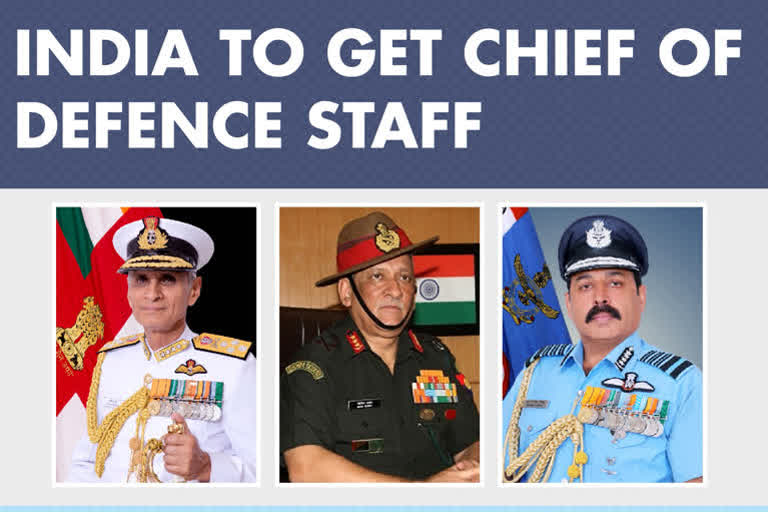New Delhi: The creation of the post of CDS (Chief of Defence Staff) with some details of the mandate and the manner in which this position will be located in the higher defence structure of governance (announced on Dec 24) is to be cautiously welcomed.
While the Modi government is to be applauded for finally taking this step – it merits recall that the idea of creating a CDS was mooted as far back as 2001 – and the real challenge will be the way in which this post is empowered and the locus accorded within the governance matrix of India.
The post of the CDS was envisioned as one that would provide a single point of contact and advise on matters military to the civilian apex of the country and various proposals were debated in the public domain. The CDS was expected in one formulation to be a super Chief who would be placed above the current military leadership and some even recommended a five star status. Models from other democracies were reviewed for their relevance to India.
However, what has finally emerged is a very Indian model and shaped by the Modi government’s approach to national security. The official release states unambiguously of the CDS: "He will act as the Principal Military Adviser to Raksha Mantri on all tri-Services matters. The three Chiefs will continue to advise RM on matters exclusively concerning their respective Services. CDS will not exercise any military command, including over the three Service Chiefs, so as to be able to provide impartial advice to the political leadership."
Read: India to get its first Chief of Defence Staff, here's all you need to know
Thus the CDS will be the ‘principal adviser’ to the Defence Minister and not the single-point adviser. Furthermore, the CDS will wear two hats: one as the permanent Chairman of the COSC (Chiefs of Staff Committee) and the second as the head of the DMA (Department of Military Affairs ) in the Ministry of Defence and “function as its Secretary.”
The CDS will be provided “with salary and perquisites equivalent to a Service Chief ” but would occupy a higher place protocol-wise in relation to the three service Chiefs.
The mandate given to the CDS is enumerated as: Promoting jointness in procurement, training and staffing for the Services through joint planning and integration of their requirements; Facilitation of restructuring of Military Commands for optimal utilisation of resources by bringing about jointness in operations, including through establishment of joint/theatre commands; and Promoting use of indigenous equipment by the Services.
Seemingly innocuous and routine, the creation of the DMA to be headed by the CDS is a very significant first step in the civil-military relations of independent India. If the Secretary hat of the CDS is empowered in the manner that it ought to be – this will be the first time that the Indian military will be formally inducted in the loop of governance.
Currently, the responsibility of the defence of India as per the Rules of Business devolves on the Defence Secretary, who is the senior civil servant in the Ministry. How the CDS will be inducted into the lattice of governance and whether the post will be enabled in the same manner as the Defence Secretary or be accorded an ex-officio status remains to be seen.
Read: General Rawat tipped to be country’s first CDS
This would be critical for the CDS to pursue the three main objectives that have been mandated. Each of them is HUGE in its own domain and when realized – they would transform the profile and efficacy of the Indian military. Jointness leading to theatre commands is the Holy Grail that the Modi government has prioritized and rightly so to bring about the much-needed re-wiring of India’s military that was recommended after the Kargil war of 1999. These will take years of due diligence and high professional integrity to be successfully pursued.
The other critical element that will determine the effectiveness of the CDS will be in the allocation of resources – both human and financial. The HR strand will be by way of how the DMA will be staffed and the military-civil specialist mix, as also the overall allocation of financial resources to the armed forces in the annual budget.
Currently, the defence budget does not have adequate provision for the modernization of the inventory much less for acquiring new technological capabilities such as in the cyber-space-spectrum domains. Will the CDS be able to prevail upon the system to enhance current allocations - both annual and for the 15-year perspective plans?
The CDS has a daunting task ahead to provide the necessary professional experience and 'Yes Minister' acumen to lead the long-neglected reforms in India’s higher defence management. The silver lining is that the Modi government has finally picked up the gauntlet. How resolutely the DMA and the CDS will be nurtured by the principal stakeholders – the political leadership, the bureaucracy and the military - will be the central determinant that will shape the texture and index of India’s composite military capability in the decades ahead.
Will PM Modi be able to emulate in the defence sector what PM Narasimha Rao did to the Indian economy?
Read: CDS is major step towards bringing about jointmanship between Armed Forces: Rajnath Singh



